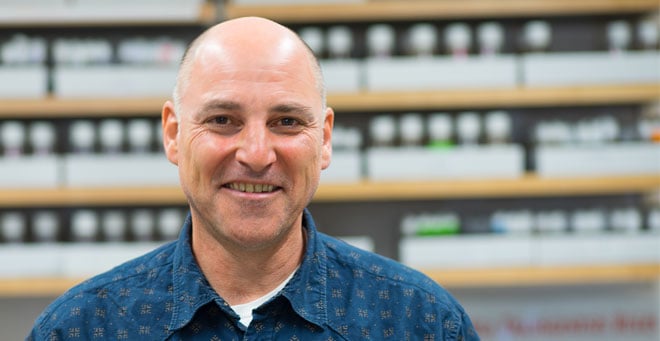 |
|
|
Andreas Bergmann, PhD |
UMass Medical School scientist Andreas Bergmann, PhD, has received a five-year, $3.5 million Maximizing Investigators' Research Award (MIRA) from the National Institutes of Health for his research program that uses fruit flies to investigate genetic control of apoptosis, or programmed cell death, and compensatory cell proliferation. Understanding how these basic processes of life can go awry and give rise to diseases, notably cancer, may hold clues to therapeutic targets.
“This honors the entire body of work of the investigator. It supports all the research efforts in my lab. Now I have everything under one umbrella and can focus entirely on my research,” said Dr. Bergmann, professor of molecular, cell & cancer biology. “I’ve always had two or three R01 awards from the NIH that supported very specific projects. The MIRA now replaces all these single grants into one large grant.”
A pilot initiative of the NIH’s Outstanding Investigator Award Program, MIRA provides extended funding that enables researchers to devote more time and energy to working in the lab and less time writing and revising grant applications. It is designed to encourage investigators to embark on ambitious, long-term projects of unusual potential. According to the National Institute of General Medical Sciences, which awarded Bergmann’s grant, MIRA-supported investigators will have greater flexibility to try ideas that might be considered high risk.
While normal cell death and cell creation are essential to life, inappropriate control of these processes results in either uncontrolled cell proliferation, as in cancer, or uncontrolled cell death, as in brain diseases like Alzheimer’s and muscle-wasting diseases like muscular dystrophy. With his MIRA grant, Bergmann will continue his research program’s longtime focus on understanding the genetic control of cell death and cell proliferation in cancer. It will further enable him to expand his inquiries into neurodegenerative disorders in which cell death is uncontrolled.
“I’m very interested in neurodegeneration, because unlike cancer, we have too much cell death, where neurons die inappropriately,” Bergmann explained. “This is not directly covered by the MIRA, but the MIRA allows me to venture into other research areas and try things out. Maybe it won’t work and I won’t continue, but I’m no longer at risk to lose my grants by working on unrelated topics not covered by the original grants.”
Notably, the Bergmann lab has identified genes involved in cell death control and execution in Drosophila, and discovered a process called apoptosis-induced compensatory proliferation that must be taken into account when identifying cells that are potential drug targets. Following 11 years at the MD Anderson Cancer Center in Houston, Bergmann brought his lab to UMMS in 2011.
“I regard the MIRA as recognition of all the people in my lab who have done, and continue doing, the work,” he said. Bergmann’s lab comprises three postdocs, two students and two technicians; one member recently moved on to start his own lab, another endorsement of the lab’s quality and productivity.
“The MIRA combines all kinds of things, not just research,” Bergmann explained. “They also look at your service to the community, your training, your mentoring. It’s like a lifetime career achievement award.”
Other MIRA recipients at UMMS include Patrick Emery, PhD, professor of neurobiology, and Paul Thompson, PhD, professor of biochemistry & molecular pharmacology.
Related stories on UMassMedNow:
Patrick Emery receives $4.1M outstanding investigator award
University of Massachusetts announces $1.17 million in faculty awards